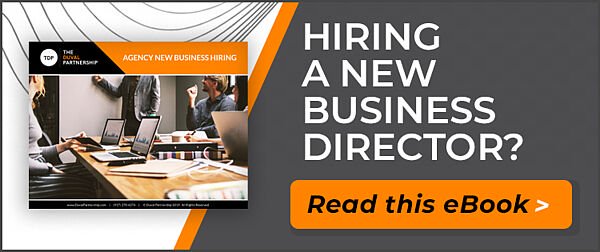This is the second post from my interview with Chris Shumaker, former CMO of The Martin Agency, FCB Worldwide, Publicis USA, and Grey NA. In it, Chris generously shares his insider insights about how it is possible to win a spec pitch even without the winning work.
Editor’s note: Interview has been edited for length and clarity.

How can an agency win a pitch when it doesn’t have the best work?
Mark: You recently gave a presentation on “Winning Without the Winning Work” at the 4A’s Manager Practitioner's Forum in Chicago. I would love to have you take us through that a bit; how can an agency actually win the pitch when it doesn't have the best work?
Chris: The paradigm in our industry is if you bring the best work, you will win. Which, of course, suggests that if you don’t bring the best work on the final day you will lose. I don’t subscribe to this thinking. I believe you can still win even if you don’t have the best work on that final day because I have.
One time I was in a pitch for a major global account against some of the best agencies in the business. We worked hard throughout that pitch to land the work, but on that given day, we just didn’t have it. Another agency had the better idea, and yet, we won. After the dust settled, I had an opportunity to speak with the client about why we won. He told me that his review team evaluated the entire review process, not just one meeting. And that’s why we won. Consultants instruct their clients to do the same, to evaluate the entire journey of the review process, not just one meeting.
My pitch strategy was to plan to win without the work, with the operative word being ‘plan.’ Of course, there is an entire strategy and creative team working to create the winning solution, as they should be. But from a pitch strategy standpoint, as a new business strategist, I didn’t create the work; that wasn’t my job. My job was to put the team in a position to win without relying 100% on the work. If we brought the winning work, fantastic! But if we didn’t on that final day, I still wanted to win.

“According to consultants I've talked with, agencies are winning spec pitches without the winning work about 15-20% of the time.” — Chris Shumaker
One aspect of how I think of pitch strategy is to divide the pitch team into two sub-teams: a Content Team, and a Competition Team. The Content Team is exactly that—they'll focus on the content, the brief, the client’s audience, the deliverables for the meeting, the strategy—everything that you would expect an agency to do.
But while the Content Team is doing their job, the Competition Team is thinking about all the variables of the competition — our client audience, our competition, our brand and our flawless execution at every touchpoint. This team studies the decision makers, the influencers, the competitive agencies, and how to neutralize their case studies and experience. The real reason for the review and how to leverage that insight to separate from the pack. The review process itself and how to make relevant contact along the journey. These are the people who think strategically about the competition and every single touchpoint along the way.
I had one review where the client was so impressed with the reverence and respect we had for our own brand that he believed we would treat their brand and relationship with the same respect. With every touchpoint, we were building trust and confidence in our team to the degree that if our work was off on the final day, which it was in this case, the client defended us in the deliberation room. You are in a good place when the client is telling his colleagues, “You know what, they just had an off day. They're really good people and I really like them. They're talented, they're smart, they understand our business, they understand our challenges, they just had an off day. I think if we work with them, we can get there.”
When clients start defending you in the deliberation room, you’re in a good place. So with the Competition Team, I start with that picture in mind as a goal, and say, “All right, what do we have to do to make that happen?” And what you don't do is sit back and say, “Let's just wait for the work to present and we should win.” That's how not to do it, I believe.
Mark: I love how you look at the entire process versus that final standup pitch—which is, I suspect, what many agencies focus on. So in order to win without the winning work, you have really set that tone from day one; you've set yourself apart from the other agencies from day one of the process.

Think ahead to get ahead
Chris: Exactly. A pitch strategy I like is trying to be one meeting ahead. At the final assignment briefing, start talking about strategy. At the strategy work session, complete the strategy discussion and start showing creative. At the creative work session, show refined and improved creative pivoting off their remarks heard at the strategy session. Be one meeting ahead so you are always leaning forward and separating yourself from the competition.
I believe to get an edge in this hyper-competitive business, you have to think about the entire pitch process and wrap all your deliverables in a theme that speaks directly to the hidden agenda. You need to unearth the real reason for the pitch and use that knowledge to your advantage. As one very brilliant consultant once told me, in the early stages of a pitch, bond with the clients around their problem, not your solution. They expect you to be creative and have ideas, but they don’t expect you to have a thorough understanding of their challenges and the unique dynamics of their business. Understanding the real reason behind the review is a good starting point.
There was a pitch a few years ago where the new business person insisted to the consultant that the agency needed to speak directly with the CMO about the issued RFP. They were granted access and had a candid conversation with the client about what the review was really all about. Turns out the review had nothing to do with the performance of the work, but it had everything to do with the lead agency’s inability to collaborate with the other partner agencies. It was a frustrating situation that the client had to resolve.
As a result, from the RFP all the way through the review, this agency’s theme for the pitch was all about partnership. “That's what we do; we build partnerships, we're about partnership and collaborating.” The team pounded the strength of their partnerships with clients, with partner agencies, and with each other. The client was smitten from the RFP response. “You get it!” was what the client was thinking, and the agency took a huge lead and never looked back. They won it before the final meeting.
Mark: Well, it's interesting, we just talked about the RFI, and for that, it's “don't get eliminated.” Now the other side of that coin is, now you're in it to win from day one; you're there to win this thing.

Win the pitch from day one, not the day of
Chris: As new business consultant Mark Goldstein says, “win it before the final meeting.” Meaning, you have to put yourself in a position where you're not dependent on one meeting to win it or lose it. That's very important. That’s what I mean by planning to win without the winning work.
I believe if you put 100% of your chips on the final creative work presented, you are playing high stakes poker and I personally don’t like those odds. I have lost with the best work, and I have won without the best work. I like trying to bring the best work while planning to win without the best work, hence the two team strategy.
I became a student of pitch strategy years ago after one unforgettable pitch. I was with a very well-respected creative agency. The review consultant instructed all the finalist agencies to bring to the final meeting three campaigns complete with three executions each in TV, OOH, print and radio. They were very specific about what to bring and how much, and of course, we brought it all and much more. And yet, the winning agency didn't bring any work. Zero. They talked about strategy and broad creative concepts...and they won. And I was like, “What?!” How could that be? What's really going on here?”
Mark: And so that’s when you started to wise up about playing by the rules and taking the process at face value? It was your wake-up call that if you bet everything on the work, you actually have a greater chance of losing?
Chris: Exactly.
Parting thoughts
Does it surprise you to learn that it’s so common to win a pitch without the winning work? Is your agency among those that puts everything into the work, while not paying as much attention to every touchpoint in the process? Try Chris’ approach and see how it improves your outcomes in upcoming pitches.
This is the second portion of our interview with Chris Shumaker. Based in Richmond, VA, Chris began his consulting practice last year and can be reached at Shumaker4@gmail.com. Read the first post from our interview—about changing your agency’s approach to RFIs and RFPs for greater success—here.
Thinking about hiring a director of new business? Read this first:
Read More:
- Factors that Decide the Pitch — Aside from Creative
- Pitching Insights for Small to Mid-Sized Agencies
- Can Agencies Truly Win When Procurement is Involved?
- How to Sidestep the Broken RFP / Pitch Process (with Chris Perkins)
Image Credits: win agency pitch ©Adobe Stock/Daxio Productions; win without the winning work ©Adobe Stock/pressmaster; winning agency work ©Adobe Stock/Ana Tramont; how to win agency pitch ©Adobe Stock/pressmaster.



